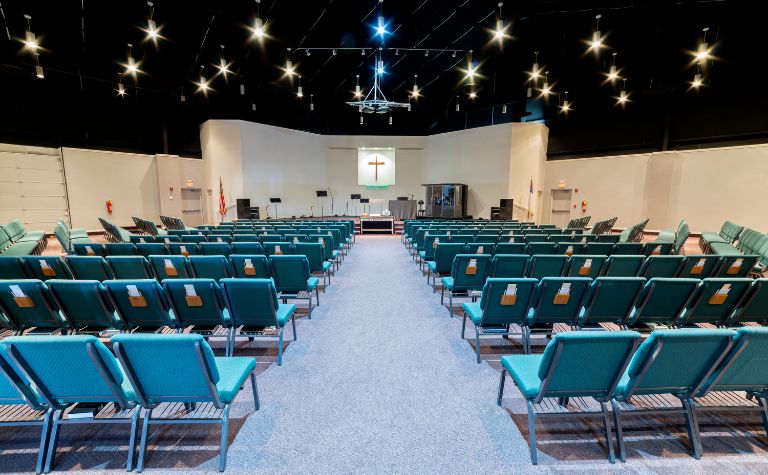Assemblies of God churches and non-denominational churches are each a significant part of Christianity in the world today. Millions of followers of Jesus Christ attend such churches every week. Though they have some overlapping areas of belief and practice because they are both Protestant, they have important differences as well.
Assemblies of God is a Pentecostal Protestant denomination, while non-denominational churches are Protestant but not necessarily Pentecostal. Assemblies of God emphasizes baptism in the Holy Spirit, evidenced by speaking tongues. Some non-denominational churches believe that, but others don’t.
What else is the same and different about Assemblies of God and non-denominational churches? What do they believe and practice? Why are they each growing so rapidly? Keep reading to learn more.
Also, see Assemblies of God vs. the Church of God: Differences to learn more.

Assemblies of God vs. Non-Denominational Churches
Assemblies of God churches and non-denominational churches have a lot of similarities. In fact, in some cases, if a non-denominational church is Pentecostal, a person could attend a service with members from each group and not notice a lot of differences between them.
The chart below is a starting point for people to understand what makes each group unique. (Also see Assemblies of God vs. Foursquare: What’s the Difference?)
| Assemblies of God | Non-Denominational | |
|---|---|---|
| Branch of Christianity | Protestant; evangelical; Pentecostal | Protestant; mostly evangelical; some Pentecostal, some not |
| Founding | 1914 in Arkansas though important events in their history traced back to Kansas a decade earlier | non-denominational churches grew in number in the 2nd half of the 20th century |
| Membership | 65 million globally | millions, but ultimately unknown because there is no central tracking system |
| Salvation; Calvinist or Arminian? | by grace through faith in Christ alone, which reflects Protestant theology; Arminian | by grace through faith in Christ alone, which reflects Protestant theology; a church may be Calvinist or Arminian |
| Ordinances | water baptism and the Lord’s Supper; consistent with Protestantism | water baptism and the Lord’s Supper; consistent with Protestantism |
| Doctrinal emphasis | baptism in the Holy Spirit evidenced by speaking in tongues | varies widely from church to church; some may be Pentecostal, others Reformed, and still others Baptist |
| church government | congregational, but the denomination also has state and regional ministerial organizations | mostly congregational, but some are pastor or elder-led; none have state or regional ministerial organizations |
| Pastor qualifications | varying degrees of formal education, but most have attended a Bible college or seminary; license and ordination opportunities for those in ministry | varying degrees of formal education, but most have attended a Bible college or seminary; no certification or accreditation opportunities |
Why is it challenging to collect data on non-denominational churches? Non-denomination churches are independent in a way that Assemblies of God churches aren’t.
Assemblies of God churches are independent in that each body conducts its own affairs, including the election of leaders. (Also see Assemblies of God vs. Pentecostal: What’s the Difference?)
However, Assemblies of God churches are still part of a global entity that has state and regional organizing bodies. Church leaders attend district meetings, provide financial support for shared endeavors like missions, and participate in other joint efforts. Non-denominational churches have no such affiliations with the wider body of Christ.

What Are Non-Denominational Churches and Where Do They Come From?
Below are three questions people commonly ask about non-denominational churches:
What are non-denominational churches? Non-denominational churches are theologically Protestant. They are often independent of any ministry network or association and have no history with a traditional denomination, like Methodist, Lutheran, Baptist, or Presbyterian. (Also see Assemblies of God vs. Catholic: What’s the Difference?)
Where do non-denominational churches come from? Historically, people looking to transform perceived errors in doctrine and practice in existing traditions have started many Christian denominations.
For example, Martin Luther initially sought to reform the Catholic church, not start a denomination called Lutheranism. Likewise, John Wesley initially sought to reform the Anglican church, not start the Methodist denomination.
Sometimes people who establish a non-denominational church are displeased in some way with churches affiliated with a traditional denomination. Some Christians see “denominationalism” as bad and they believe starting a new church is the best option. (Also see Assemblies of God vs. Methodist: What’s the Difference?)
What do non-denominational churches believe? Most non-denominational churches are Protestant, not Catholic. Many are conservative evangelical and hold to beliefs such as:
- the Trinity; that is, God is one yet exists in three persons: Father, Son (Jesus Christ), and Holy Spirit
- the inspiration and authority of Scripture
- the death of Christ as an atonement for sin and his bodily resurrection from the dead
- salvation is by grace through faith in Christ alone
- the Church is the body of Christ in the world
- there are two ordinances: water baptism and the Lord’s Supper
- the return of Christ
- Non-denominational churches may be Calvinist or Arminian; Pentecostal and charismatic or not; Premillennial or Amillennial
| BELIEFS | Assemblies of God | Non-denominational churches |
|---|---|---|
| Theology (general) | Assemblies of God is Protestant. They believe that salvation is by grace through faith in Christ alone and not according to works. | The majority of non-denominational churches are Protestant. They believe that salvation is by grace through faith in Christ alone and not according to works. |
| Theology (specific) | Assemblies of God are Arminian. Within the framework of Arminianism, their belief systems is often referred to as “Pentecostal theology.” | A church could be Arminian or Calvinistic in their theology; there are often Baptist-like elements in non-denominational churches no matter their theological convictions, such as believer’s baptism. |
| God | Assemblies of God believe in the Trinity. There is one God who exists in three persons. | Non-denominational churches are also Trinitarian. |
| Is Jesus God? | Yes | Yes |
| Is the Holy Spirit God? | Yes | Yes |
| The Bible | #1 of The 16 Fundamental Truths state, “The Scriptures, both the Old and New Testaments, are verbally inspired of God and are the revelation of God to man, the infallible, authoritative rule of faith and conduct.” | Non-denominational churches are generally evangelical and conservative; the authority, inspiration, and inerrancy of Scripture are often part of their doctrinal statements. |
| BELIEFS | Assemblies of God | Non-denominational churches |
|---|---|---|
| View of the atonement | Assemblies of God believes in the penal-substitutionary atonement of Christ. His death was the punishment for sin, and he took the place of sinners on the cross. | Non-denominational churches affirm the truth of the Gospel and believe that Christ took the place of sinners and paid their penalty on the cross. |
| Salvation | #5 of The 16 Fundamental Truths state, “Salvation is received through repentance toward God and faith toward the Lord Jesus Christ. By the washing of regeneration and renewing of the Holy Spirit, being justified by grace through faith, man becomes an heir of God, according to the hope of eternal life.” | They could be Calvinist or Arminian, but not Lutheran. |
| Spiritual gifts | Assemblies of God believes that all spiritual gifts mentioned in the Bible are operational today, including speaking in tongues, divine healing, and miracles. | They could be cessassionist or continuationist. |
| Water Baptism | Believer’s baptism; only professing believers, not infants, are baptized. Baptism isn’t necessary for salvation. | Most practice “believer’s baptism,” which describes the conviction that only professing believers should be baptized; infants aren’t baptized, but children can be as soon as they are able to make a genuine profession of faith. |
| Communion | #6 of The 16 Fundamental Truths state, “The Lord’s Supper, consisting of the elements — bread and the fruit of the vine — is the symbol expressing our sharing the divine nature of our Lord Jesus Christ, a memorial of his suffering and death, and a prophecy of His second coming, and is enjoined on all believers ’till He comes!'” | They are mostly seen as a memorial of the death of Christ. |
| Eschatology | #14 of The 16 Fundamental Truths state, “The second coming of Christ includes the rapture of the saints, which is our blessed hope, followed by the visible return of Christ with His saints to reign on earth for one thousand years.” | Many are dispensational and Premillennial. Those with Reformed theology may be Premillennial (similar to Reformed Baptists) or Amillennial. |
What are non-denominational church pastors like? Pastors of non-denominational churches are often trained through education and ministry experience, like the clergy in traditional denominations.
Sometimes pastors begin as bi-vocational, which means they work non-ministerial part-time jobs and work part-time as a pastor. This arrangement is sometimes a financial necessity when a new church is young.
Non-denominational churches, because they don’t have the financial support of a large, worldwide denomination, often start similar to how a small business starts: they are few people, they have little income, and they have few staff or clergy. Pastors play a similar role to entrepreneurs. (Also see What Does Assemblies of God Believe About Tithing?)
Where Do Assemblies of God Churches Come From?
In approximately 100 years, the Assemblies of God went from inception to one of the largest Christian denominations in the world. They trace through roots to 1914 in Arkansas. Their doctrine of emphasis, speaking in tongues, is traced to Kansas about a decade earlier.
There were multiple reasons that Pentecostal Christians and the churches they attended sought unification and organization:
- Ministerial effectiveness through unity and combined efforts
- Doctrinal unity surrounding Pentecostal beliefs and practices
- Unity over standing against “Oneness Pentecostalism,” a movement that taught against the orthodox Christian doctrine of the Trinity
- The joint pursuit of being recognized by state and local governments for the purposes of minimizing persecution and utilizing tax advantages

Why Are Assemblies of God and Non-Denominational Churches Growing?
At the beginning of the 21st century, many Christian denominations are declining. Assemblies of God and non-denominational churches are growing. Church historians and sociologists continue to study why this is the case, but a few things are clear:
They are newer than other denominations and churches: Non-denominational churches are relatively young. Assemblies of God, even though it’s over 100 years old, is young compared to other traditional Protestant denominations like Lutheranism (500 years old), Presbyterianism (400 years old), and Methodist (300 years old).
Why does youthfulness help? Older Protestant traditions have centuries of traditions that can be challenging for new people to embrace. When a denomination is embedded into a culture (e.g., Lutheranism and Germany or Methodism and England), it is easier to trace one’s family roots in that tradition and see one’s culture in it as well.
Yet some denominational traditions seem outdated to many young people and young families, so they attend churches that seem newer and perhaps more relevant. Many young people associate the hymns of Lutheranism, Methodism, and Presbyterianism with their grandparents, for example.
Is Assemblies of God is experiential? Some sociologists attribute the growth of the Assemblies of God denomination to it being an experiential and verbal religion. To be clear, Assemblies of God pastors and theologians would likely disagree with this description. They would credit the denomination’s growth to God’s work through the Holy Spirit.
To understand what some sociologists are saying, consider this: Many Christian denominations have a tradition of teaching catechisms, which are memorized questions and answers as a way to teach doctrine. Throughout history, people of all ages would memorize answers to theological questions as a way to learn about God and Scripture, which took hours, days, and even months to accomplish.
In contrast, the unique doctrinal emphasis of the Assemblies of God is baptism in the Holy Spirit, evidenced by speaking in tongues. So a person doesn’t need to spend hours and days and weeks memorizing theology to belong to the community; rather, they must only have a spiritual experience that occurs in a moment which requires no instruction, teaching, reading, or intellectual strain.
Conclusion
Assemblies of God and non-denominational churches have a lot of similarities, but they have key differences, too. Both will continue to play an important role in Protestant Christianity in the 21st century.
Please see the related articles below.
References:
[1] Source
[2] Source
[3] Source
Related Articles
The Assemblies of God and Baptist traditions are sizable and significant branches of Protestant Christianity. They each have a fascinating history in Europe, America, and as of the twenty-first...
The Assemblies of God and the Church of God (Cleveland, Tennessee) are two of the oldest Pentecostal denominations in the world. There is a lot that unites these Protestant-Christian traditions, yet...
